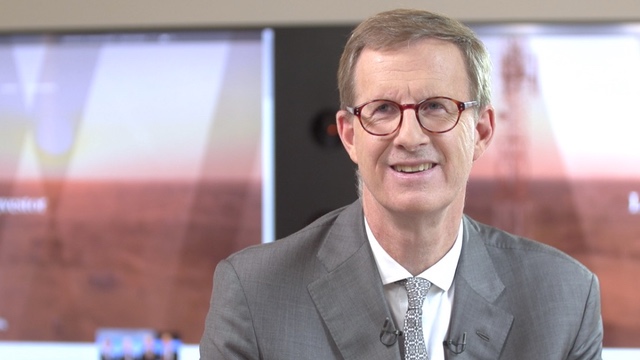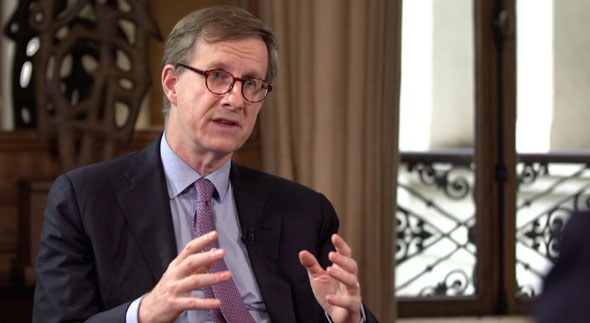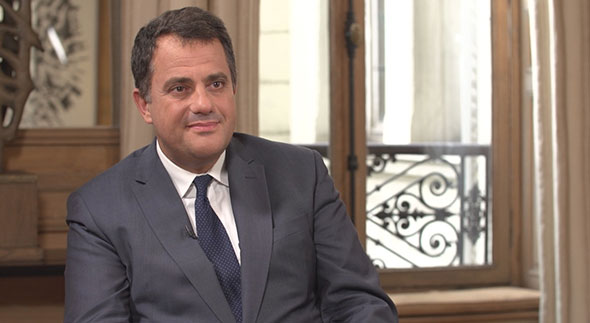EuroBusinessMedia (EBM): WENDEL, one of Europe’s largest listed investment companies, just reported earnings for the first half, Jean-Bernard Lafonta welcome
Jean-Bernard Lafonta (JBL): Thank you
EBM: You are the CEO of Wendel, to begin, what are your comments on the company's first half results?
JBL: The first comment is that in a more difficult environment since last summer in 2007 the quality of our net income is very strong. As you see, we have an increase in net income from subsidiaries, which is increasing by 31%. This performance comes from every subsidiary of the Wendel group, and each of them contributes significantly to this performance. Some of them still enjoy significant organic growth, some of them are suffering more in an environment which is difficult. But these are adapting to the environment, and the other ones are taking all the potential for growth. And altogether, we have this diversification of businesses which allows Wendel to make that performance, and we are very happy with that.
EBM: Through a strategic committee, you now partake in the decision-making at Saint-Gobain. How is the relationship with the group's management coming along?
JBL: We came to the board of Saint-Gobain in June. Thanks to the approval of the general meeting at a level of 98%. Bernard Gautier and myself joined the board. We are part of the strategic committee, which already had a first meeting, and of course we have a strong work relationship with the management of Saint-Gobain. We exchange with them about the potentials we see, we share the risk and support initiative, and we are very happy about what they did regarding adaptation to a more challenging environment; they decided to launch an action plan to save about 350 million euros, which is not negligible compared to the plan they announced last July, which was for 300 million euros for the next three years. So we are rather happy about this beginning of the relationship.
EBM: The market is expecting you to dispose of your stake in Stallergenes -- would you care to react?
JBL: We constantly say that Stallergenes has a strong potential for development, due to the approval they obtained for the Oralair tablet last June in Germany. This potential will be developed by Stallergenes in Europe, and there is further potential in the US for which Stallergenes needs a commercial partnership. They are currently working on that, we are currently supporting them on that. This is the main target we have.
EBM: Standard & Poors recently confirmed your investment grade credit rating. How much financial leeway do you have today?
JBL: I would like to remind you that we have had a very strict financial policy for 6 years now, made up of several points. First, we have a balance between our assets and resources, in terms of length. Maturity of our debt with recourse on Wendel is of six years. That means we have a lot of time before any significant credit reimbursement. We have very high liquidity. The liquidity of Wendel is at the present time of 2 billion euros in our balance sheet, compared to an average of 1 billion euros in the past. And on top of that, we have syndicated credit which is not used up, of 1.25 billion euros. So liquidity above 3 billion euros, and this liquidity gives us a lot of comfort in more challenging market conditions, but also for seizing opportunities which will arrive at a certain stage of the cycle, likely in 2009. We have followed constantly for 6 years now, a rating, a ratio, which is our internal ratio, made of net debt with recourse on Wendel to the gross asset value of our assets, and this ratio is at the present time at 26.5%. The threshold we contemplate is of 30%, and we want to achieve 20%, on average over the cycle, of this ratio. This is the policy which we apply and we will continue to apply that policy. This policy is perfectly compatible with the strategy of Wendel, consisting of asset rotation over time. We sold for 4 billion euros worth of assets over the last five years, and we bought for 4 billion euros of assets over the same period of time.
EBM: Some analysts note that your portfolio is essentially concentrated around three lines: Bureau Veritas, Legrand and Saint-Gobain. Is this a handicap for Wendel, and do you think it's necessary to so something about it?
JBL: I would like first to point out the fact that these three assets are, each of them, of a very high quality, as demonstrated by their earnings in the first-half of the year. Altogether, they represent something like 60% of the gross asset value of Wendel [including liquidity], meaning each of them is around 20% of the gross asset value. So this is not a weight which is excessive, especially if you consider that each of these companies is itself very diversified, in terms of geography and in terms of businesses. To take an example, Bureau Veritas, the most significant asset we have in terms of value: this company is in 8 different business lines, and 140 countries, and the diversification of this company is itself very impressive. So altogether, the conviction I have is that the diversification of Wendel is quite satisfactory, as demonstrated again by the quality of the net income we have in this first-half.
EBM: What is your outlook today on the LBO market? Does the market still appear to be shut down, as in the first-half of the year?
JBL: The view we have is that it should improve progressively over the next quarters. It has been almost shut down for one year now, and we expect it will normalise in the first quarters of 2009.
EBM: Lastly, concerning your private equity stakes, what is your update and outlook?
JBL: Regarding our private equity stakes, we consider that the performance we had is quite strong in terms of growth for Deutsch; the net income of Deutsch was multiplied by 20, and they still are in a context which allows the delivery of a strong performance. Regarding Stahl, same comment. And regarding Materis, the environment is more challenging, but they were able to adapt to that environment, and we expect they will continue to do so. So we are very happy about what each of these companies did in the first-half; we expect they will continue - in a more challenging environment - to deliver very good earnings, or adaptation like Materis, and we are also very happy about what our public companies did, such as Bureau Veritas, Legrand or Saint-Gobain.





